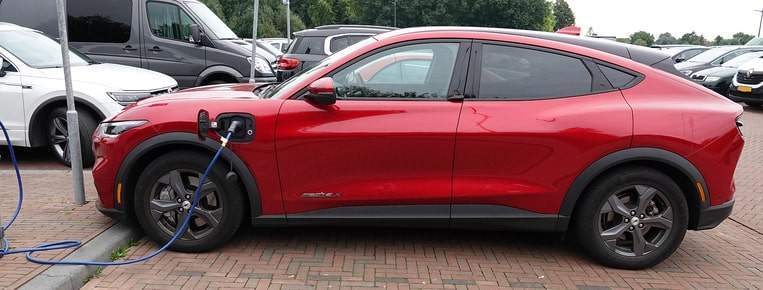Should I Buy an Electric Car?
Contemplating the switch to electric? Let’s navigate the road of pros and cons to help you decide!
Should I Buy an Electric Vehicle?
“Should I Buy an Electric Car?” is a question buzzing in the minds of many potential car buyers today. As the world accelerates towards a greener future, electric vehicles (EVs) are rapidly transitioning from a niche luxury to mainstream must-haves.
But with any significant decision comes a slew of considerations—environmental benefits, costs, performance, and the ever-growing charging infrastructure, to name a few.
Before you hit the accelerator on your EV journey, let’s delve into the intricacies of this electric debate and ensure your next drive aligns with your values and lifestyle.
Buckle up; it’s going to be an electrifying ride!
Electric Car Price Tip: If you’re in the market for an electric car, you may have noticed that finding a reasonable price can be difficult in today’s market. Many car buyers end up paying more than the suggested retail price. But don’t worry! You can still get a great deal on a new electric vehicle by requesting a free car price quote to compare dealer prices in your area.
Table of Contents
- Introduction to the electric car debate
- A brief history of electric cars
- The Benefits of Going Electric
- Concerns when considering an electric car
- Electric cars vs. traditional gasoline cars
- EV infrastructure vs. traditional gas stations
- Additional costs and considerations
- Making the decision: Is it right for you?
- Frequently asked questions
- Final thoughts: The electric drive forward
- Tips on how to get a great deal on an EV
Introduction to the Electric Car Debate
Electric cars, also known as EVs (Electric Vehicles), have become a hot topic in recent years. Why, you ask? It’s like when sliced bread was introduced – revolutionary!
Let’s plug into this topic and charge up our knowledge.
A Brief History of Electric Cars
Electric cars might seem like a brainchild of recent technological advances, but you’ll be amazed to know they’re anything but modern. Let’s take a nostalgic trip down memory lane:
- The Humble Beginnings: The inception of electric cars can be traced back to the early 1800s. The first half-hearted attempts at creating electrically powered vehicles were seen as early as the 1830s. It’s like uncovering an ancient relic in your backyard.
- Peak Popularity: By the late 19th and early 20th centuries, electric cars were gaining traction, especially in urban areas. Why? They were quieter and didn’t have the “crank” – a manual engine starter, which was often a workout!
- The Decline: With the advent of the internal combustion engine and the discovery of large petroleum reserves, gasoline cars took center stage. Their more extended range, faster refueling, and cheaper costs made EVs almost obsolete by the 1920s.
- Modern Resurgence: The oil crisis of the 1970s renewed interest in electric cars. And with the modern-day emphasis on environmental concerns and advancements in battery technology, EVs are back in the spotlight, more vital than ever. Today’s models, with their sleek designs and impressive ranges, are hardly reminiscent of their early ancestors.
So, while electric vehicles might seem like the trendy newcomers in the automotive world, they’ve been around the block. Like that pair of bell-bottom jeans that made a surprising comeback, electric cars have reclaimed their place in the automotive limelight.
The Benefits of Going Electric
Joining the world of electric vehicles offers more than just a modern ride; it’s a ticket to numerous advantages.
Let’s explore the manifold benefits of going electric, from championing eco-friendly choices to enjoying long-term savings.
Environmentally Friendly
Transitioning to an electric vehicle isn’t just a personal choice; it’s a step towards a sustainable future. Let’s break down its green credentials:
- Zero Emissions: Unlike traditional gasoline vehicles, EVs produce no tailpipe pollutants. This means reduced harmful emissions that contribute to climate change and air pollution.
- Reduction in Greenhouse Gases: The electric cars’ efficiency translates to fewer greenhouse gas emissions, even when accounting for power plant electricity generation.
- Reduced Dependence on Fossil Fuels: By driving an EV, you reduce the oil demand, paving the way for a greener energy future.
Cost Savings Over Time
Electric vehicles might have a steeper initial price tag, but their cost-benefit analysis over time paints a different picture:
- Lower Fueling Costs: Charging an EV, on average, is substantially cheaper than the gasoline counterpart. Depending on where you live, electricity can be a fraction of the cost of gasoline. You can compare gas prices vs. EV charging prices using the US Department of Labor Statistics average energy prices for the United States.
- Fewer Maintenance Needs: No oil changes, fewer moving parts, and regenerative braking systems mean less wear and tear. This translates to potentially lower maintenance costs over the vehicle’s lifespan.
- Tax Incentives and Rebates: Various governments and states offer incentives for EV purchases, making the initial investment more palatable.
Performance: The Electric Edge
Electric vehicles are not just about eco-friendliness; they pack a severe punch regarding performance.
Here’s a peek into what gives them the edge:
- Instant Torque: Unlike traditional vehicles that may need a moment to rev up, EVs deliver power instantly. This means rapid acceleration from a standstill, perfect for those “zoom off the traffic light” moments.
- Smooth Ride: Say goodbye to gear shifts and the jolts they bring. With an EV, you’re in for a seamless, uninterrupted driving experience, all thanks to the consistent power delivery of electric motors.
- Silent Operation: EVs are a treat if you’re tired of the vroom and roar of engines. Their whisper-quiet operation makes for a tranquil ride.
- Optimal Weight Distribution: Most EVs have a low center of gravity thanks to the strategically placed batteries, offering superior stability and handling.
- Consistent Performance: Whether it’s a chilly winter morning or a blazing hot afternoon, electric cars deliver consistent performance across varied conditions, unlike some gas vehicles that might be sluggish in extreme temperatures.
In essence, when it comes to performance, electric cars are swiftly setting new standards and giving traditional vehicles a run for their money.
The Rise of Charging Infrastructure
The growth and accessibility of charging points have made owning an EV more convenient than ever:
- Proliferation of Charging Stations: Many cities are investing heavily in building public charging infrastructure. From malls to office spaces, finding a spot to charge is becoming more accessible.
- Home Charging Solutions: You can now install a personal charging station at home, ensuring your vehicle is always ready for the road.
- Fast Charging Networks: Companies are developing superchargers that can juice your EV in minutes, not hours, making long road trips more feasible.
Electric vehicles are not just about being trendy. They’re a testament to technological advancements, environmental consciousness, and a forward-thinking approach to transportation.
After all, who wouldn’t want to contribute to a cleaner planet while saving money in the long run?
Concerns When Considering an Electric Car
Making the shift to electric vehicles comes with its fair share of considerations. While the benefits are numerous, it’s essential to understand and plan for some of the associated challenges:
Initial Costs
When comparing price tags, electric vehicles often incur a higher upfront cost than traditional gasoline cars. Here’s what to keep in mind:
- Technology Investment: The advanced technology, especially in the battery and drivetrain, can increase initial costs.
- Potential Savings: It’s worth noting that many governments and states offer incentives or tax rebates to offset these initial costs. Plus, the lifetime fuel and maintenance savings can compensate for the steeper purchase price.
Battery Lifespan and Replacement Costs
Like any rechargeable battery, the one in your electric car has a finite lifespan:
- Degradation Over Time: The battery’s capacity and range can reduce over the years, and after many charge cycles, you might not get as many miles from a full charge as you once did.
- Replacement: Eventually, the battery might need replacement after many years of use. While prices for EV batteries have been decreasing, they can still represent a significant expense. However, many manufacturers offer extended warranties specifically for the battery.
Charging Station Availability
While EV charging infrastructure has grown leaps and bounds, there’s room for expansion:
- Urban vs. Rural: While city dwellers might find many charging options, those in rural areas might find fewer stations.
- On-The-Go Charging: If you’re planning a road trip or frequently travel longer distances, you must map out available charging stations along your route. Apps and in-car navigation systems often assist with this, but it requires a different mindset than simply looking for the nearest gas station.
- Home Charging: If you have a garage or a dedicated parking spot, investing in a home charging unit can alleviate many concerns about finding a public charging spot. However, apartment dwellers might face challenges in setting up personal charging solutions.
While these concerns are valid, it’s important to remember that technology and infrastructure continually evolve.
As more people make the electric switch, the challenges of today could very well be the relics of tomorrow.
Electric Cars vs. Traditional Gasoline Cars
Step back to a time before 2016, and you’d find the average electric car panting after barely 100 miles. As the U.S. Department of Energy and the U.S. Environmental Protection Agency noted, top-tier EVs hit the ceiling at just under 300 miles back then.
Flash forward to today, and the EV landscape has dramatically transformed. You can now snag an electric vehicle boasting a 250-mile range for under $30,000. And if you’re looking to splurge, some deluxe models will give you a whopping range north of 500 miles.
But here’s the twist in our electric tale: despite the leaps and bounds in EV technology, traditional gas guzzlers still have the upper hand in the marathon race. Some beastly pickup trucks can clock in almost 1,000 miles before gasping for a refill.
And while we’re on refueling, let’s talk speed. Gas-powered vehicles can gulp down a full tank in the blink of an eye or at least in a few minutes. In contrast, even with the flashiest of chargers, an EV might need a good half-hour pause to get all charged. It’s like comparing a sprinter to someone leisurely tying their shoelaces.
Performance
When it comes to the driving experience, electric vehicles offer unique perks that often edge out traditional cars:
- Instant Torque: Electric motors deliver power directly to the wheels. This means you get immediate thrust from a standstill, giving EVs that signature quick acceleration.
- Smooth Acceleration: Without the need to shift gears, electric cars offer a smooth and seamless acceleration curve. No more jerky gear changes!
- Lower Center of Gravity: Thanks to the placement of heavy batteries at the bottom, EVs tend to have a lower center of gravity, which can improve handling and stability.
- Quiet Operation: The hum of an electric motor is substantially more silent than the roar of a gasoline engine, leading to a serene driving environment.
Maintenance and Repairs
Maintenance can often be the hidden cost of vehicle ownership. When comparing EVs to gasoline vehicles, the balance often tilts in favor of electric:
- No Oil Changes: Electric cars don’t have oil to lubricate their motors like traditional vehicles. This means you can wave goodbye to regular oil changes.
- Fewer Moving Parts: Traditional engines have hundreds of moving parts, including the transmission. In contrast, electric motors are much more straightforward, leading to potentially less wear and tear.
- Regenerative Braking: Many electric cars use regenerative braking systems, which capture and store energy during braking. This conserves energy and can lead to less wear on the brake pads and discs.
- Longer Service Intervals: Without things like exhaust systems, radiators, and fuel injection systems, many EVs can have extended periods between necessary service visits.
However, it’s crucial to remember that while maintenance might be reduced, electric cars aren’t entirely upkeep-free. Battery health, tire rotations, and other standard checks remain vital.
Your priorities dictate the winner in the grand tussle between electric and traditional vehicles.
Electric might be the way to go if you value performance and reduced maintenance.
On the other hand, if you’re hesitant about the current state of charging infrastructure or prefer the long-established reputation of gasoline vehicles, you might lean the other way.
Charting the Growth of EV Infrastructure vs. Traditional Gas Stations
As of 2023, electric vehicle charging points have been popping up at an impressive rate—doubling over the past five years to a commendable 140,000+ chargers spread across approximately 53,000 locations—there’s still some catching up. After all, with their roaring engines and nostalgic charm, gasoline stations boast almost 120,000 locations nationwide, as per the Association for Convenience and Fuel Retailing.
Now, picture the scene: most EV charging locations feature only one or two chargers, perhaps resembling that solo coffee machine in a small office. In contrast, high-speed charging hubs, especially along major highways, compare a bustling café with multiple brews (or chargers) on the go.
Moreover, the well-oiled machinery (pun intended!) supporting gasoline cars—think replacement parts, seasoned mechanics, and the like—is robust and time-tested. Electric vehicles, the new kids on the automotive block, are still navigating challenges. For instance, the fate of today’s EV batteries, once they’ve served their purpose in a decade or so, remains a topic of discussion.
Making the Home Charging Shift: Additional Costs and Considerations
Charging your EV in the comfort of your home, perhaps while sipping a cup of coffee, sounds downright ideal. But brace yourself: introducing Level 2 charging at home could mean shelling out extra cash.
Now, you might wonder, “Do I need Level 2?” While you can make do with Level 1, the temptation of Level 2’s zippy charging rate—injecting about 25 miles of range every hour—might be too alluring to resist, especially when compared to Level 1’s more modest five miles per hour.
The financial pinch comes down to various elements. An electrician might need to establish a fresh 240-volt connection, bridging your home’s electrical hub to your chosen charging spot.
Once that’s done, plugging in the charger is a breeze. Some EVs even roll out the red carpet, offering a Level 2 charger right out of the gate. If yours doesn’t, be ready to budget an extra $500 or more.
And here’s a tip: some trendy EVs might toss in a Level 2 charger and cover the installation costs of the 240-volt line. How’s that for a sweet deal?
Making the Decision: Should You Buy an Electric Car?
Choosing between an electric car and its gasoline counterpart isn’t just about comparing specs and costs. It’s about aligning your choice with your lifestyle. Before you decide to go electric, delve into some key considerations:
Lifestyle Considerations
Your lifestyle and locale determine how seamlessly an electric vehicle fits into your daily rhythm.
- Where You Live: Urban areas typically boast a higher density of charging stations, making EV ownership more convenient. In contrast, rural areas might still be catching up regarding EV infrastructure.
Daily Commute
Navigating the daily hustle and bustle of commutes can shape your electric vehicle experience; let’s break down the essential considerations for those routine drives.
- Average Drive Length: Analyze your daily drive. If your commute or errand runs fit comfortably within the middle range of most electric vehicles, you’re looking at a hassle-free EV experience.
- Charging Options: Consider the availability of charging stations at or near your workplace. Some employers offer charging facilities, which can be a significant boon.
- Traffic Patterns: EVs, with their regenerative braking, can be more efficient in stop-and-go traffic, potentially extending your range during those bumper-to-bumper days.
Traveling Long Distances
Hitting the open road with an electric vehicle requires a blend of adventure and meticulous planning; here are some pointers to ensure a smooth journey.
- Route Planning: With the rise of navigation tools catering specifically to EV drivers, it’s easier to map your journey with charging stops in mind.
- Charger Speed: For longer trips, you might want to identify fast-charging stations along your route, ensuring minimal pit stops.
- Backup Plans: Always have an alternative charging spot in mind. It can be handy if your primary charging station is occupied or out of service.
- Overnight Stays: Consider booking accommodations with EV charging if your journey spans multiple days. It’s a growing trend, especially in eco-conscious lodgings.
As the electric wave surges, ensuring an EV aligns with your lifestyle is crucial. While they offer numerous benefits, their suitability depends on how and where you drive.
Whether you’re a city dweller zipping short distances or an adventurer charting cross-country routes, aligning your transport choice with your life’s rhythm ensures a harmonious ride.
FAQs About Buying an Electric Car
How long do electric car batteries typically last?
On average, EV batteries can last between 10 to 20 years, depending on usage and maintenance.
Are there any incentives for buying electric cars?
Many governments offer tax incentives and rebates for purchasing EVs. Check your local regulations for more info.
Can I charge an electric car at home?
Absolutely! Many EV owners install home charging stations for convenience. It’s like plugging in your phone at night.
Is it more expensive to maintain an electric car?
Generally, EVs require less maintenance than gasoline cars. However, battery replacements can be costly.
Do electric cars have a good resale value?
As the demand for EVs grows, at the time of writing this article, their resale values also show a positive trend.
Final Thoughts: The Electric Drive Forward
Embracing the electric vehicle movement is more than just acquiring a new set of wheels; it’s a testament to your dedication to fostering a sustainable tomorrow.
Like all significant decisions, there are pros and cons to weigh. Electric cars offer many benefits, from reduced carbon footprints to potential long-term savings.
Conversely, considerations such as charging infrastructure and upfront costs might give one pause.
So, as you stand at this crossroads, pondering if an electric vehicle is your next journey companion, remember this guide aims to illuminate the path.
So, should you buy an electric car? Only you can answer that, but hopefully, we’ve sparked some thought!
Making an Informed Choice: The Power of Research Before Purchasing
In the grand car-buying journey, preparation is your most trusted co-pilot, whether buying an EV or a traditional gas-powered vehicle.
This also pertains to when buying a brand-new model or considering a pre-loved vehicle; thorough research is crucial.
Here’s why:
- Down Payment Decisions: Understanding how much money you should put down can influence your financing rates and monthly payments. A more substantial down payment often reduces your loan amount, leading to potential savings on interest over time.
- Decoding Dealer Profit: Recognize that dealerships are businesses aiming for a profit. By researching a fair profit offer, you can balance a good deal for you and a reasonable profit for the dealership.
- Unearthing the Dealer Cost: The dealer invoice price or the dealer cost gives you an insight into what the dealership paid for the car. This knowledge allows you to negotiate more effectively, aiming for a fair price for both parties.
- Harness Online Tools: Before entering a dealership, use free online car-buying tools for free local price quotes. These quotes provide a ballpark figure, arming you with knowledge and preventing potential overcharges.
By being proactive and informed, you position yourself as a savvy consumer, ensuring you drive off not just with a car you love but a deal that doesn’t weigh heavy on your wallet.
Always remember: Knowledge is horsepower in the car-buying race!


















